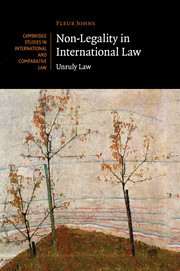Description
Non-Legality in International Law
Unruly Law
Cambridge Studies in International and Comparative Law Series
Author: Johns Fleur
Shows how international lawyers make non-law (extra-legal, illegal and other non-legal phenomena) and why this matters in global politics today.
Language: English
Subject for Non-Legality in International Law:
Approximative price 36.76 €
In Print (Delivery period: 14 days).
Add to cart
Non-Legality in International Law
Publication date: 04-2015
282 p. · 15.2x22.9 cm · Paperback
Publication date: 04-2015
282 p. · 15.2x22.9 cm · Paperback
Approximative price 93.25 €
In Print (Delivery period: 14 days).
Add to cart
Non-Legality in International Law
Publication date: 01-2013
282 p. · 15.2x22.9 cm · Hardback
Publication date: 01-2013
282 p. · 15.2x22.9 cm · Hardback
Description
/li>Contents
/li>Biography
/li>
International lawyers typically start with the legal. What is a legal as opposed to a political question? How should international law adapt to the unforeseen? These are the routes by which international lawyers typically reason. This book begins, instead, with the non-legal. In a series of case studies, Fleur Johns examines what international lawyers cast outside or against law - as extra-legal, illegal, pre-legal or otherwise non-legal - and how this comes to shape political possibility. Non-legality is not merely the remainder of regulatory action. It is a key structuring device of contemporary global order. Constructions of non-legality are pivotal to debate in areas ranging from torture to foreign investment and from climate change to natural disaster relief. Understandings of non-legality inform what international lawyers today do and what they refrain from doing. Tracing and potentially reimagining the non-legal in international legal work is, accordingly, both vital and pressing.
1. Making non-legalities in international law; 2. Illegality and the torture memos; 3. Black holes and the outside within: extra-legality at Guantánamo; 4. Doing deals: pre- and post-legal choice in transnational financing; 5. Receiving climate change: law, science and supra-legality; 6. Death, disaster and infra-legality in international law; Conclusion.
Fleur Johns is an Associate Professor at the Sydney Law School, University of Sydney, and Co-Director of the Sydney Centre for International Law.
© 2024 LAVOISIER S.A.S.
These books may interest you

Deleuze & GuattariEmergent Law 64.97 €

Deleuze & GuattariEmergent Law 178.41 €


